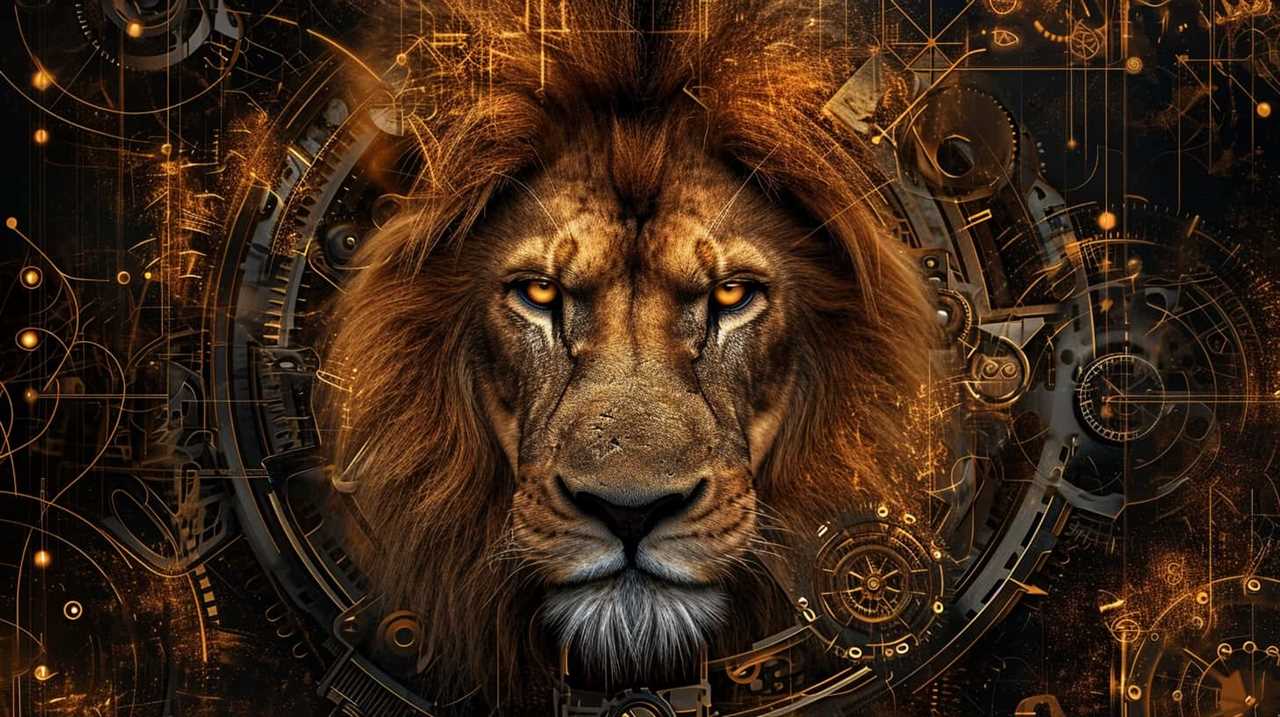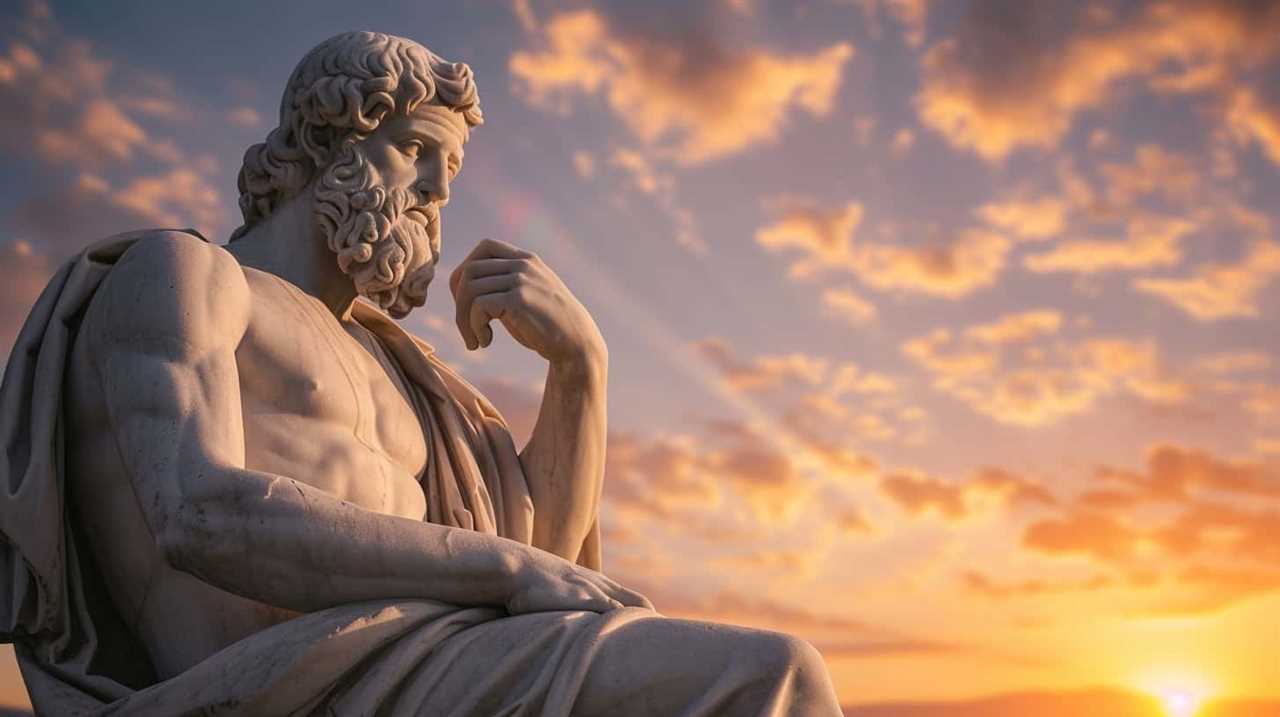Welcome to our examination of ‘5 Key Metaphysical Quotes on Reality by Aristotle’! Throughout this short exploration, we will explore the profound insights of one of the most renowned philosophers in history.
Aristotle, the brilliant mind of ancient Greece, invites us to expand our horizons and challenge our understanding of reality. Through his insightful quotes, he unveils a world of innovative thinking and fresh perspectives.
From his definition of reality to his views on form and matter, Aristotle’s words will ignite the spark of curiosity within us. Join us as we embark on a quest for intellectual growth, guided by the timeless wisdom of Aristotle.
Let’s unlock the door to a realm where innovation and enlightenment go hand in hand.
Key Takeaways
- Reality is the interplay of form and matter, with form giving shape and structure to existence, and matter providing the potential for existence.
- Existence is a dynamic process of constant change and transformation, with everything in the world being in a constant state of flux.
- Potentiality and actuality are crucial concepts in Aristotle’s theory, with potentiality referring to the capacity for something to be or become, and actuality being the realization or fulfillment of that potentiality.
- Aristotle’s perspective challenges conventional notions of reality, emphasizing the importance of underlying essence or nature, and recognizing potentiality opens up a world of infinite possibilities.

Aristotle’s Definition of Reality
In exploring Aristotle’s perspective on reality, we delve into his concise yet profound definition of what constitutes true existence. According to Aristotle, ultimate reality isn’t merely a collection of individual objects or events, but rather a dynamic interplay of form and matter. Aristotle’s theory of existence posits that everything in the physical world is composed of matter, which is the potential for existence, and form, which gives shape and structure to that existence. This duality of form and matter is essential for understanding the nature of reality.
Aristotle argues that true existence lies in the actualization of potentiality through the realization of form. In other words, something is considered real when it has achieved its full potential and embodies its inherent form. This perspective challenges the notion that reality is solely defined by tangible objects and instead emphasizes the importance of the underlying essence or nature of things. It invites us to look beyond surface appearances and recognize the deeper reality that exists within.
Transitioning into the subsequent section about the nature of existence according to Aristotle, we’ll explore how this understanding of reality informs his views on causality and the nature of being.

The Nature of Existence According to Aristotle
Continuing our exploration of Aristotle’s perspective on reality, we delve into the nature of existence according to the renowned philosopher. Aristotle’s view on being is deeply rooted in his theory of being and becoming. For Aristotle, existence isn’t simply a static state, but rather a dynamic process of constant change and transformation. He believed that everything in the world is in a constant state of flux, constantly moving from one state of being to another.
Aristotle’s theory of being and becoming can be best understood through his concept of potentiality and actuality. According to Aristotle, everything in the world has the potential to become something else. For example, a seed has the potential to become a tree. However, this potentiality can only be actualized through a process of development and growth. The seed must undergo a series of changes, such as sprouting, growing roots, and eventually transforming into a fully grown tree.
In Aristotle’s view, existence isn’t simply a matter of being present in the world, but rather a process of unfolding and realization. It’s through this process of becoming that things truly come into existence. This perspective challenges our conventional understanding of existence as a static state and invites us to embrace the dynamic nature of reality. By recognizing the inherent potentiality in all things, we open ourselves up to a world of infinite possibilities and endless transformations.

Aristotle’s Views on Form and Matter
Now let’s delve into Aristotle’s views on form and matter, expanding on our understanding of existence and its dynamic nature.
Aristotle’s theory of form and matter is at the core of his metaphysical concepts. According to Aristotle, everything in the physical world is composed of both form and matter. Form represents the essence or the specific characteristics that define an object, while matter refers to the underlying substance or material that gives shape to the form.
Aristotle believed that form and matter are inseparable and exist in a symbiotic relationship. He argued that matter alone is potentiality, lacking the specific qualities that make something what it is. On the other hand, form actualizes the potentiality of matter, giving it purpose and identity. This interplay between form and matter is what allows objects and beings to come into existence and undergo change.
Furthermore, Aristotle viewed form as the organizing principle that determines the nature and function of an object. It’s through form that objects acquire their distinctive properties and perform their specific roles in the world. Matter, on the other hand, provides the necessary material for form to manifest itself.
Aristotle’s theory of form and matter provides a profound insight into the nature of reality. By understanding the dynamic relationship between these two concepts, we gain a deeper understanding of existence and the ever-changing nature of the world around us. This perspective encourages us to explore the infinite possibilities that arise from the interplay of form and matter, sparking innovation and pushing the boundaries of our understanding.

Aristotle’s Concept of Potentiality and Actuality
Let’s explore Aristotle’s understanding of potentiality and actuality in relation to reality.
In Aristotle’s philosophy, the distinction between potentiality and actuality is crucial to understanding the nature of existence. According to Aristotle, potentiality refers to the capacity or possibility for something to be or become a certain way, while actuality refers to the realization or fulfillment of that potentiality.
Aristotle’s notion of potentiality and actuality can be seen in various aspects of his philosophy. For example, in his theory of causality, he argues that potentiality is the cause of change, while actuality is the result or outcome of that change. In this sense, potentiality represents the unrealized possibilities that exist within a thing, while actuality represents the actual manifestation of those possibilities.
Furthermore, Aristotle applies this distinction to his understanding of human nature. He believes that humans possess the potential to develop certain virtues and abilities, but it’s through the actualization of these potentials that we truly become who we’re meant to be.
By examining Aristotle’s concept of potentiality and actuality, we gain a deeper understanding of the complexities of reality. It challenges us to think beyond what’s currently manifest and consider the vast range of possibilities that exist within every aspect of our existence.
This philosophical perspective encourages us to embrace innovation and explore the untapped potential within ourselves and the world around us.

Aristotle on the Prime Mover and Final Cause
Exploring Aristotle’s understanding of the Prime Mover and Final Cause sheds light on his metaphysical perspective on reality.
Aristotle’s concept of causality plays a crucial role in his explanation of these concepts. According to Aristotle, the Prime Mover is the ultimate cause of all motion and change in the universe. It’s the unmoved mover, unaffected by any other cause, and is responsible for setting the cosmos in motion. This Prime Mover isn’t a physical entity but rather a divine intellect, a pure form of thought that contemplates itself and is the source of all other forms of thought.
Aristotle’s beliefs on the Prime Mover and Final Cause are deeply intertwined. The Final Cause, also known as the telos, is the purpose or end towards which all things strive. It’s the ultimate goal or reason for the existence of any object or being. Aristotle argues that the Prime Mover, as the highest form of intellect, is the final cause of the universe. The Prime Mover’s own desire for self-contemplation is what drives all other beings towards their own fulfillment and actualization of their potential.

Frequently Asked Questions
What Is Aristotle’s View on the Purpose of Life?
Aristotle’s perspective on the purpose of life can be summarized as the pursuit of eudaimonia and the fulfillment of one’s potential. It is a thought-provoking concept that challenges us to strive for excellence and self-actualization.
How Does Aristotle’s Concept of Potentiality and Actuality Relate to Human Behavior?
Aristotle’s concept of potentiality and actuality provides insight into human behavior. By understanding that we have untapped potential waiting to be actualized, we can delve into the depths of psychology and strive for self-actualization.
What Is Aristotle’s Stance on the Existence of God?
Aristotle’s stance on the existence of God is a matter of debate. While he acknowledged a divine being as the prime mover, his theological views remain complex and open to interpretation.
How Does Aristotle Explain the Concept of Time in Relation to Reality?
Aristotle explains time in relation to reality by viewing it as the measurement of change and an essential aspect of nature. This concept challenges conventional notions and invites us to explore the profound interconnectedness of time and reality.
Does Aristotle’s Philosophy on Reality Have Any Implications for Ethics or Moral Decision-Making?
Aristotle’s philosophy on reality has profound implications for ethics and moral decision-making. By understanding the nature of reality, we can better navigate ethical dilemmas and make morally sound choices that align with the truth of existence.

Are Aristotle’s Metaphysical Quotes Still Relevant in Modern Discussions on Ultimate Reality?
Aristotle’s timeless metaphysical quotes on ultimate reality are still widely discussed in modern philosophy. His ideas on the nature of existence, causality, and substance continue to influence contemporary debates on the ultimate reality of the universe. Many scholars find relevance in his profound insights and continue to explore their implications.
Conclusion
In exploring Aristotle’s metaphysical quotes on reality, we’re thrust into a realm of profound contemplation. His definition of reality as the actualization of potentiality challenges us to question the nature of existence itself.
With his concept of form and matter, Aristotle unveils the intricacies that shape our reality. Moreover, his insights on potentiality and actuality prompt us to ponder the boundless possibilities that lie within us.
Finally, his notion of the Prime Mover and Final Cause leaves us marveling at the underlying purpose and ultimate direction of our existence. Through Aristotle’s words, we embark on a journey of intellectual enlightenment, forever captivated by the enigmatic beauty of reality.









